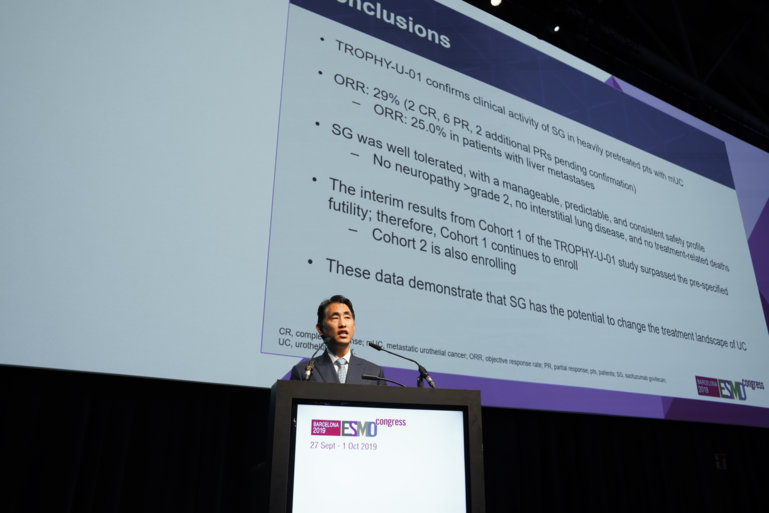At ESMO 2019, early clinical data from two studies show the promise of this new generation of treatments although not yet practice-changing
At ESMO 2019, early clinical data from two studies show the promise of this new generation of treatments although not yet practice-changing. In the TROPHY-U-01 trial, a new generation antibody–drug conjugate (ADC) called sacituzumab govitecan showed regression of cancer lesions in three out of four patients who failed platinum-based regimens or checkpoint inhibitor therapy. Promising results were also presented from a second ADC (enfortumab vedotin) in combination with immunotherapy.Treatment with sacituzumab govitecan led to an objective response rate (ORR) of 29% in the phase II TROPHY-U-01 trial (Abstract LBA55) in patients who failed platinum-based regimens or checkpoint inhibitor therapy. Encouragingly, 74% of patients experienced any degree of target lesion reductions.
"The latest data are very promising, particularly as it appears that sacituzumab govitecan is comparable with other ADCs in this setting, although longer follow-up is required,” says Dr Ignacio Duran from Hospital Universitario Marqués de Valdecilla, Santander, Spain. At a median follow-up of 4.1 months, there were 2 confirmed complete responses, 5 confirmed and 3 unconfirmed partial responses in a cohort of 35 heavily pre-treated patients. An impressive objective response rate of 25% was reported in patients with liver metastases, which are a difficult-to-treat group." New treatment options and strategies are also required as first-line therapy for patients unable to receive platinum-based chemotherapy,” says Duran.
Yesterday, an ORR of 62% and disease control rate of 90% were reported for the ADC enfortumab vedotin in combination with pembrolizumab in patients ineligible to receive cisplatin in the phase I EV-103 trial (Abstract 901O). "These results showing almost all patients having some degree of benefit are unprecedented and there is no doubt that this combination will move forward,” claims Duran." However, although these results are a positive step for these patients, longer follow-up and more evidence from randomised trials is needed. Importantly, we await findings that might help determine the role of other strategies, such as combinations with PARP, STAT-3 and mTOR inhibitors, among others," continues Duran. "Nevertheless, ADCs are likely to be a valid treatment strategy, either alone or in combination with immunotherapy. Although not currently practice-changing, Duran concludes that these early clinical data are promising. "Monotherapy results with ADCs are good but the efficacy of combination therapy, while preliminary, seems unbeatable.”
ESMO Congress 2019 abstracts:
- LBA55 - Initial results from TROPHY-U-01: A phase II open-label study of sacituzumab govitecan in patients (Pts) with metastatic urothelial cancer (mUC) after failure of platinum-based regimens (PLT) or immunotherapy
- 901O - EV-103: Initial results of enfortumab vedotin plus pembrolizumab for locally advanced or metastatic urothelial carcinoma






